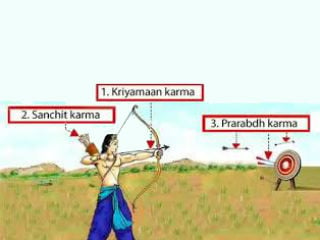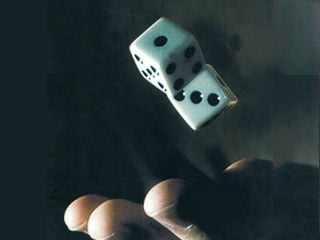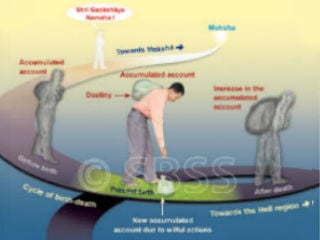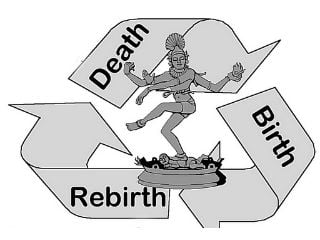Karma (An act or action which gives rise to destiny) that we do according to our intellect or will is called the kriyaman-karma. Day-to-day and occasional karma performed by an individual is called ‘kriyaman-karma’. Of the total karmas that the human beings perform, 35% are done because of kriyaman-karma. Of the entire kriyaman-karma, 90% of the karma is done to fulfil his own desire, while only 10% is done out of parechha (Others’ wish). Kriyaman-karma falls within the domain of human intelligence. Therefore, performing it correctly or otherwise solely depends on the reflex action originating from the subconscious impressions in the mind of the individual.
1. Effects of kriyaman-karma and their duration
Usually the consequences of kriyaman-karma are faced in the sanchit-karma; however, there is a Sanskrut proverb – ‘अत्युत्कटैः पापपुण्यैहि सदैव फलमश्नुते ।’, meaning, the consequences of very strong demerits or merits have to be faced in this birth or the next birth. For instance, if someone commits a murder, it is most likely that he will get the punishment of death sentence or life imprisonment in this very life.
Some effects of the kriyaman-karma are instantaneous, and their reward or punishment is on the spot. For instance, if while walking on the road, an individual unknowingly puts his foot on a smouldering piece of coal, his foot will get burnt and he will have to bear the pain immediately. Of course, that kriyaman would get exhausted with the suffering. If the same individual steals somebody’s ornaments, then there are two possibilities to that kriyaman. First – the theft gets proven. In that case, the individual will immediately receive some punishment and thus his kriyaman would get exhausted by suffering. Second – the theft is not proven. In that case, the act of theft would be added to that individual’s sanchit and he will have to face its consequences later according to prarabdha (Destiny).
Performing ‘appropriate kriyaman-karma’ means doing
seva (Service unto Absolute Truth) using optimum capacity and with
an attitude of complete surrender, which makes the seva complete in all respects
Performing a seva without optimum use of one’s capabilities is, in a sense, performing incorrect kriyaman-karma. Performing the seva by making fullest use of one’s capability with an attitude of surrender is, in the true sense, service unto God. This is said to be doing appropriate kriyaman-karma. Appropriate kriyaman-karma brings about completeness in the seva.
2. Intensity of incorrect kriyaman-karma
can be reduced by effective reactive karma
Every karma has fixed effects and they can only be nullified by specific reactive karma. For instance, if one person insults another person, then the insulted person will try to take revenge at an opportune time. The revenge may be in the form of insult, cheating, beating etc.
In such instances, one cannot defend himself from the effects of the wrath of the persons by chanting or by sadhana. One has to apologise, seek pardon for the insult, and thus pacify that person.
In case of kriyaman-karma, we already know our karma, its cause and its effects; hence, by performing the correct reactive karma, the intensity of the effects of kriyaman-karma to be endured is reduced or not required to be endured at all.
3. Kriyaman-karma and importance of devotion
A. Once, an elephant had gone to a river to drink water. There, a crocodile was waiting for its prey. It caught the elephant’s leg. The elephant used its might to try and escape from the jaws of the crocodile, but in vain. Ultimately, realising the inadequacy of its strength, it resorted to calling Srivishnu for help, who had given it strength. Srivishnu immediately came to the elephant’s help and rescued it.
B. Dharmaraj lost the Kingdom of Hastinapur while playing dice with the Kouravs. Lastly, he put the wife of the Pandavs, Droupadi at stake. That game, too, he lost and Duhshasan came forward to unclothe Droupadi right in front of the assembly. She pleaded to her husbands Dharma, Bhim, Arjun, Nakul and Sahadev to save her from disgrace, but was let down. Thereafter, she even appealed to Bhishmacharya and Dronacharya, but too no avail. As a last resort, she desperately appealed to Srikrushna for help. Srikrushna appeared in a moment and prevented her humiliation.
4. Kriyaman-karma and importance of God’s (Guru’s) grace
Ploughing the soil, manuring, sowing the seed and watering are activities that are in our hands, while germination of seeds, their growth and bearing of flowers and fruits is dependent upon God’s grace. Similarly, to be in Holy company, following Guru’s path, listening to and contemplating on the scriptures as told by the Guru, developing faith and devotion unto the Guru are the activities that are in our hands. While activities like sprouting of the seed of mantra (a syllable, word or words representing spiritual reality or an aspect of God uttered to protect oneself or to achieve a specific goal) sowed by the Guru in the soil of our heart in the form of love, bearing of flowers of dispassion and the fruit of Self-realisation depends entirely on the Guru’s grace.
5. Stages in the correct performance of kriyaman-karma
In order to get permanently liberated from the cycle of birth and death without getting trapped in the binding of the karma, kriyaman-karma has no alternative. For this reason, our kriyaman-karma should be such that our sanchit-karma is destroyed and prarabdha becomes bearable or is avoided. Such a karma is called ‘sadhana for God-realisation’. This is termed as correct kriyaman-karma. An ordinary person cannot perform sadhana in the first stage. For him the stages of performing correct kriyaman-karma are given ahead.
| Stage | Type of kriyaman | Useful for seeker of what spiritual level | How is the person addressed ? |
|---|---|---|---|
| First | Following Code of Righteous conduct | 30 | An Average person |
| Second | Performing right actions for leading a good life | 40 | Good and virtuous person |
| Third | Performing the right action with the sole aim of God-realisation and also performing spiritual practice | 40 | Seeker |
6. Measures to destroy the effects of kriyaman-karma
Every karma has a fruit, meaning consequence. If the karma is performed without expectation of fruit and a sense of doership, only then it does not result in the fruit of any karma and is not bound by the karma. Kriyaman-karma also needs to be performed in the same way.

 Importance of Kriyaman-karma in overcoming Prarabdha-karma
Importance of Kriyaman-karma in overcoming Prarabdha-karma How to overcome sufferings of Prarabdha
How to overcome sufferings of Prarabdha Facing the consequences of Prarabdha
Facing the consequences of Prarabdha What is Sanchit-karma and Prarabdha?
What is Sanchit-karma and Prarabdha? Kartavya (Duty) karma
Kartavya (Duty) karma Importance of karma
Importance of karma